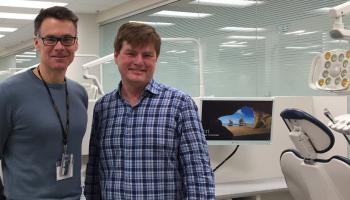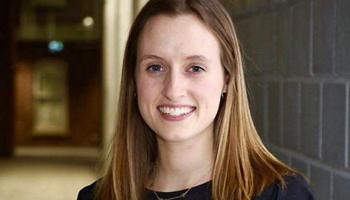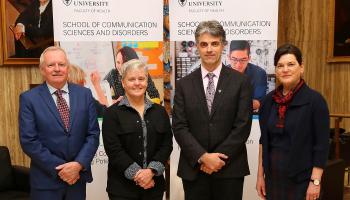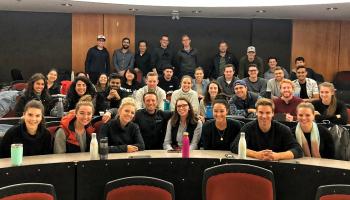Making waves
Derek Tittensor, the inaugural Jarislowsky Chair in Marine Ecosystem Forecasting, has made great strides in his first year.
As Canadian business leader and philanthropist Stephen A. Jarislowsky was creating a multi-million-dollar foundation, a curious British ocean-lover was biking five miles every day from his home in Sussex to the local seashore to collect animals and marine life.
That budding British scientist was Derek Tittensor, who turned his passion into a prestigious academic career as a marine specialist focusing on biodiversity.
Little did they know that years later, they would be working together to explore changes in marine ecosystems with the goal of developing sustainable solutions.

Dalhousie Biology research and Jarislowsky Chair in Marine Ecosystem Forecasting, Dr. Derek Tittensor. (Danny Abriel)
This past September, Dr. Tittensor, who was educated in both Scotland and Canada, became the inaugural Jarislowsky Chair in Marine Ecosystem Forecasting—the first of its kind in Canada. The chair was established through a $2 million donation from the Jarislowsky Foundation and a matching contribution from the Ocean Frontier Institute (OFI).
Driving marine research excellence
The Jarislowsky Foundation has funded 34 chairs at Canadian universities, museums and institutions, across a rich and diverse spectrum of topics ranging from contemporary Canadian art to central banking and the environment.
“Our mission is simple: to create lasting change and encourage innovation and leadership by funding excellence in research—conducted by top people who also serve as mentors to the next generation—for the betterment of Canada,” explains Jarislowsky.
As an avid fisherman, Jarislowsky’s motivation for creating this position was his interest in how climate change is impacting one of the world’s most precious resources: water. “We want to make Dalhousie the international reference point for marine ecosystem forecasting,” he says. “Over time, the results generated by this new chair will feed into better, more realistic regulation and better policy-making, not only in Canada, but in jurisdictions worldwide.”
For Dr. Tittensor, who has spent the past eight years working for the United Nations Environment Programme World Conservation Monitoring Centre in Cambridge, he sees it as an extraordinary chance to do unique work.
“I am very grateful for this fantastic opportunity to push the boundaries of ocean science and sustainability into the future.
“Dalhousie and the OFI form a natural home for my work as extremely strong centres for marine biological research. I am delighted and I am also keen to share my knowledge and expertise with Dal students to help build a new generation of passionate marine scientists.”
Catalyzing change
Dr. Tittensor has already made waves as chairholder.
In November, Dr. Tittensor and his team published the paper "Integrating climate adaption and biodiversity conservation in the global oceans" in the journal Science Advances. The paper includes eight recommendations to help integrate climate change adaptions into the design and management of Marine Protected Areas (MPA).
Read also: How climate change threatens the effectiveness of Marine Protected Areas (Dal News, November 2019)
This publication has sparked conversations with MPA managers about how to operationalize these recommendations, and Dr. Tittensor is in discussions around new collaborations to make this happen with some prominent protected areas.
“Addressing climate change in MPAs is crucial to safeguarding marine biodiversity and ecosystem services long-term. The MPA managers we’re talking with are keen to incorporate climate change considerations, because they are well aware that this is a crucial need and see how it will help to build resilience in a changing world. It’s an important step to help them maintain healthy and sustainable ecosystems not just in the present day but also into the future.”
From this paper, Dr. Tittensor and his team also created a policy brief that was distributed at the United Nations Climate Change Conference COP25—one of the largest and most prominent international conferences in the world. “It’s not enough to develop new approaches,” says Dr. Tittensor. “You have to get the information in front of the people who can put it into action.”
Positive thinking
Another one of Dr. Tittensor’s innovative projects involves developing positive scenarios for marine future, so-called “target-seeking” scenarios. Usually, marine ecosystem forecasting uses current trends to predict how species will react to changes, often with dire results. Dr. Tittensor is taking a different approach.
“We’re starting with the desired outcome—a sustainable and biodiverse ecosystem—and creating scenarios to identify the policies and actions that are required to achieve that result,” he explains. By bringing together different specialists like marine ecologists, climate scientists and economists, not only is Dr. Tittensor taking a holistic and collaborative approach, but he is aiming to create viable solutions that work for all stakeholders.
The project is gaining momentum through the inaugural meeting of the Fisheries and Marine Ecosystem Model Intercomparison Project, which Dr. Tittensor leads, at the Food and Agriculture Organization of the United Nations in Rome this past fall. “We’ve forged strong connections and partnerships with colleagues from around the world in this international partnership, and they are helping us to build these positive scenarios.”
Eventually, Dr. Tittensor would like to develop interactive, multimedia representations of these scenarios, available through apps and a website, where people can experience a healthy and robust marine ecosystem and coastal community to see how our interactions with the ocean might need to change. He’s passionate about inspiring and empowering people to be part of the solution.
“Not everyone knows first-hand what a healthy marine ecosystem looks like,” he says. “That’s why it’s so important to provide people with the opportunity to experience it virtually. If they can see and understand what a healthy ocean means, I think that will go a long way towards helping to motivate them to make the changes necessary to achieve it. And I believe in providing people with inspiring—but scientifically robust—futures that show it is not too late to build a sustainable relationship with our oceans and their ecosystems.”









